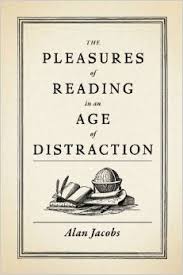Jacobs, Alan The Pleasures of Reading in an Age of Distraction. New York: Oxford University. 2011. Print.
First Sentences:
"Oh man," he said, "I had to read that in school last year. Maybe I learned something about how to read a book, but after that I never wanted to read a book again."
Description:
A while back my teenage son drifted into the room where I was reading, tilting his head to catch the title of the book in my hands.It was that venerable classic How to Read a Book by Mortimer Adler and Charles van Doren.
"Oh man," he said, "I had to read that in school last year. Maybe I learned something about how to read a book, but after that I never wanted to read a book again."
Description:
I love books about books, especially ones that introduce me to a bunch of new titles to explore and promote reading as a worthwhile pastime full of surprises and satisfaction. But even better is when an author's philosophy on reading and evaluating books conforms to mine! Alan Jacobs' The Pleasures of Reading in an Age of Distraction fills my needs to a "T".
To Jacobs, "It's wrong to read a bunch of books you don't want to read" with the goal to impress other people, teachers, etc. For him, the reason to read any book is clear: for "pleasure and joy."
He lambasts authors of the very books, How to Read a Book, 1001 Books You Must Read Before You Die and similar writers who urge people to read simply to show respect for the classics. Such authors argue that people have an obligation to make sense out of these books and improve one's mind, gather data, impress others, or change behavior. For Jacobs, reading out of guilt to conform to what critics recommend is the "intellectual equivalent of eating organic greens."
Jacobs presents today's environment as one full of distractions that hinder reading: electronic gadgets, the internet, overloaded schedules, and simple human disinterest. He carefully thinks about why, in this world, some people still read, whether it is still a justifiable pastime. If reading is worthwhile, how does one recognize the quality (and also the not so great) books one should spend precious time with?
To Jacobs, "It's wrong to read a bunch of books you don't want to read" with the goal to impress other people, teachers, etc. For him, the reason to read any book is clear: for "pleasure and joy."
My commitment to one dominant, overarching, nearly definite principle for reading: Read at whim.
Attentiveness is worth cultivating: not just because it is good for you or because ... it can help you "organize your world," but because such raptness is deeply satisfying.Jacobs delightfully covers every aspect of reading with his dry wit and intelligence. There are chapters on the pleasure of re-reading books, on using e-readers, avoiding the distraction of noise and temptations, the beauty of slow reading, and embracing the pleasure of reading with enthusiasm.
The book that demands to be read, for no good reason, is asking us to change our lives by putting aside what we usually think of as good reasons....It's asking us to do something for the plain old delight and interest of it, not because we can justify its place on the mental spreadsheet or accounting ledger...by which we tote up the value of our actions.
Jacobs removes the load off many readers' minds who feel they must spend their leisure time reading books for reasons other than pleasure and joy. It is wonderful to hear his arguments and passion about the basic thrill of reading anything you want simply out of whim rather than due to obligation or guilt. That concept justifies my early love for the 26-volume Tarzan series.
One last comforting thought from Jacobs:
One last comforting thought from Jacobs:
Despite the lamentations of many contemporary Jeremiahs, the cause of reading is not a lost one by any means.
Happy reading.
Fred
Fred
www.firstsentencereader.blogspot.com
If this book interests you, be sure to check out:
Walton, Jo. What Makes This Book So Great?
The First Sentence Reader. Special Post - Resources for Finding Great Books
____________________
If this book interests you, be sure to check out:
Walton, Jo. What Makes This Book So Great?
Walton, who reads a book a day, has plenty of opinions on great science fiction/fantasy titles, the pleasure of re-reading old favorites, and science fiction/fantasy titles worthy of note. (previously reviewed here)Queenan, Joe. One for the Books.
Any author who admits to reading up to 15 books at a time is someone who has opinions on interesting (and worthless) titles. A treasure trove of titles to explore as well as clever, witting opinions on every aspect of reading and books. (previously reviewed here).
The First Sentence Reader. Special Post - Resources for Finding Great Books
Resources and books that describe titles for every reading interest. (previously reviewed here).
